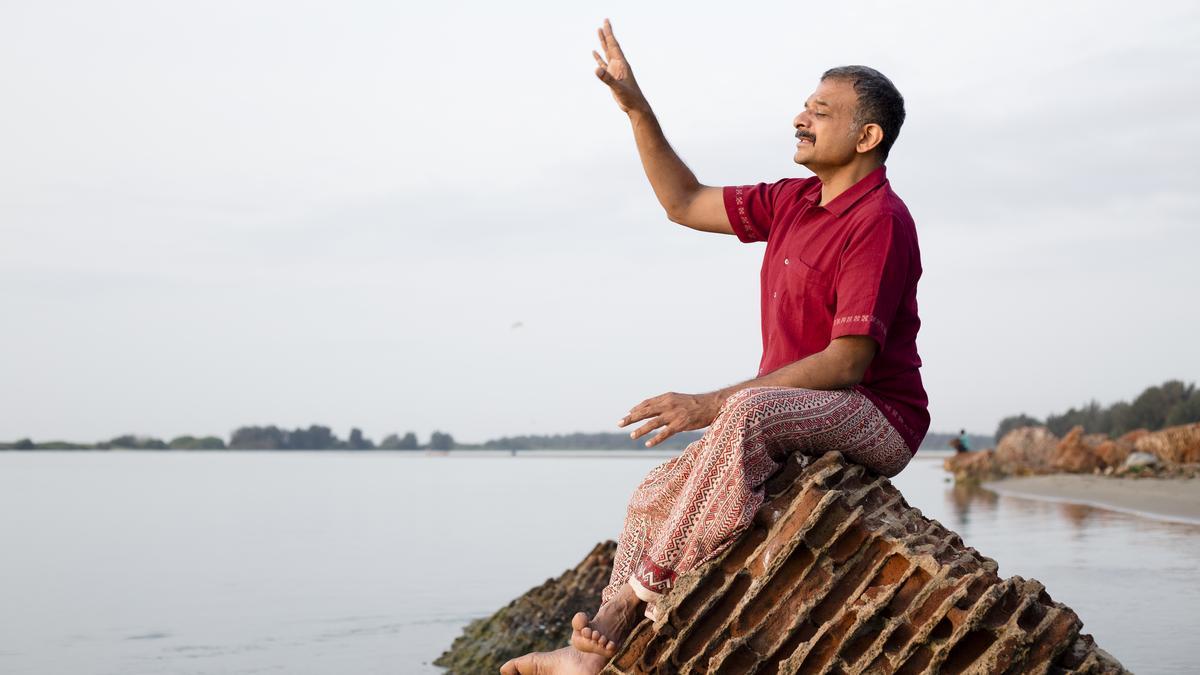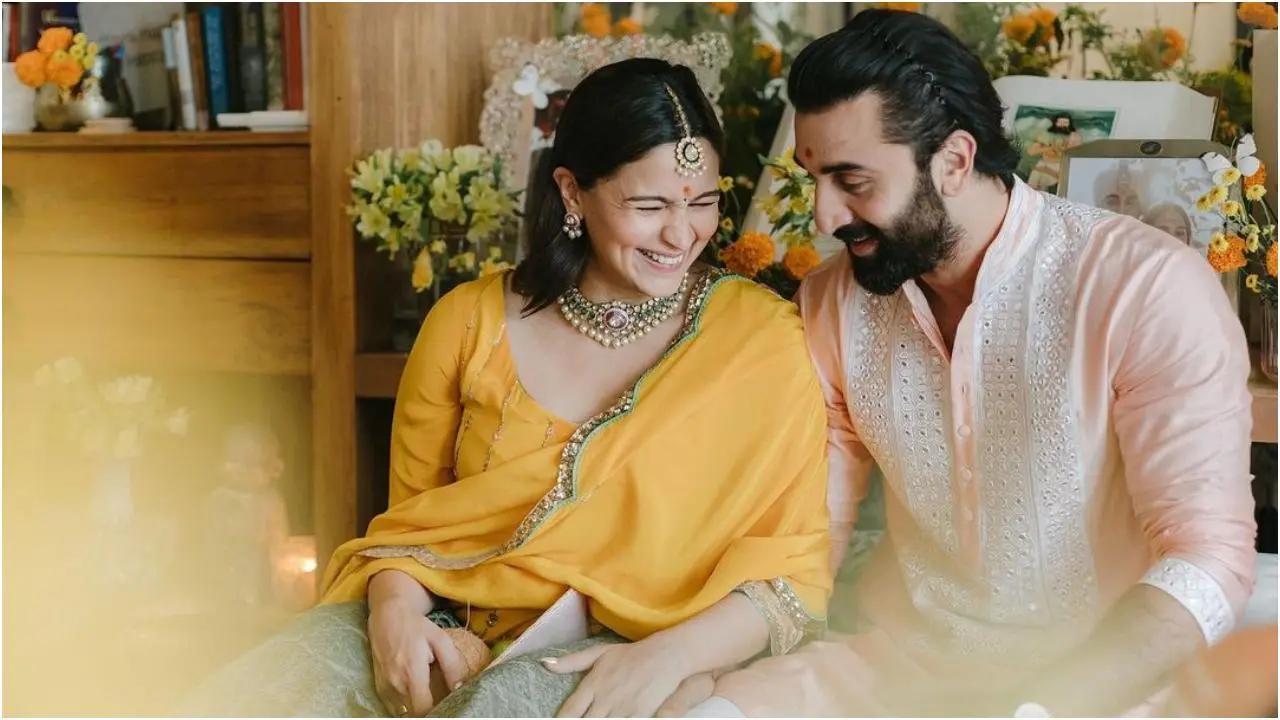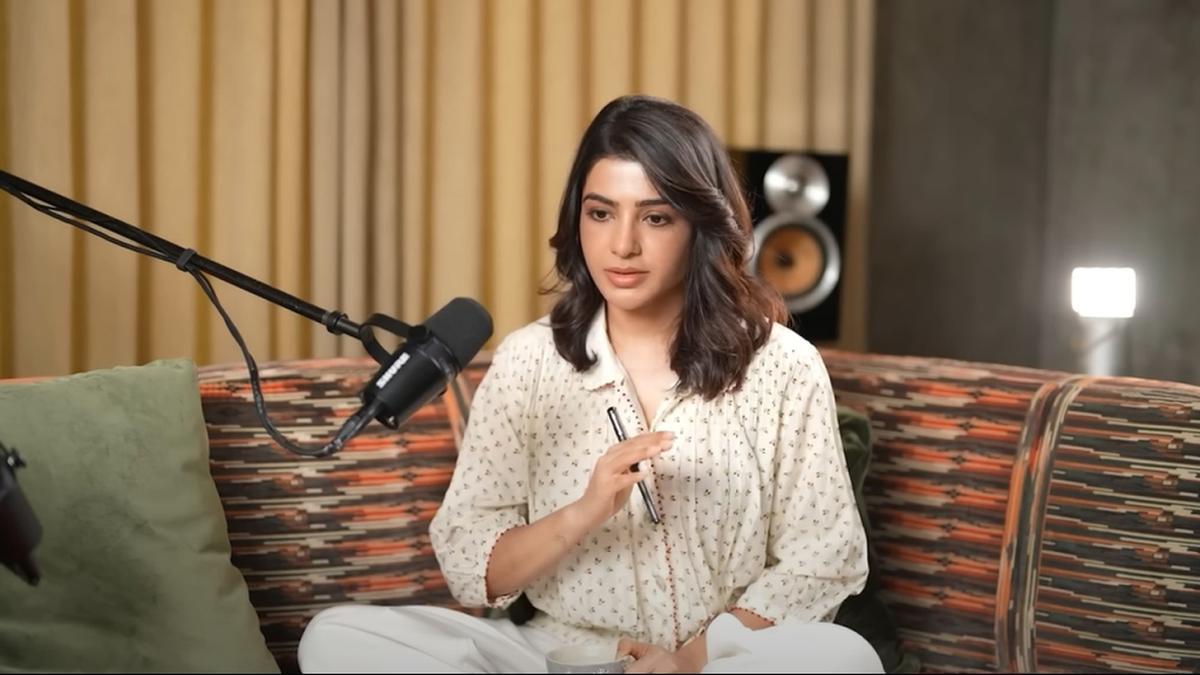
Violin exponent R. K. Shriramkumar has had the most exciting journey with Krishna, right from his first concert
| Photo Credit:
KRISHNAN VV
The affable and the argumentative
R.K. Shriramkumar
To be a musician with amazing skill and to receive worldwide recognition are laudable. But beyond all this lies the realm of svanubhuti (internalisation). When this happens, the music and the performance transform into sheer bliss where every element exists but also disappears. The music of T.M. Krishna has taken many an ardent rasika to this state.
Krishna’s dedicated engagement with the art form has opened up several queries for him. It is this path of inquiry that has shaped him as a musician, and more.
Krishna never sheds the characteristic Carnatic tone. His ragam tanam pallavi renditions, in particular the Ragamalika swara segment for the pallavis are quire delightful.
Encouraging his violin accompanist to change ragas, keeping in mind similar gamaka contours, picking up from where the violinist finishes and changing another raga from there is something that Krishna does with finesse. Krishna’s love for the tambura is well known. His concerts sound well-rounded by the sheer nada of the instrument.
Krishna’s quest for knowledge — in any facet of life — is noteworthy. The trait of acquiring and absorption comes naturally to him. From his gurus, peers and friends to even the next generation, Krishna has imbibed immensely. His renditions of many kritis of Sri Muthuswami Dikshitar is testimony to his intense study and internalisation of the colossal Sangita Sampradaya Pradarshini. Several Dikshitar kritis saw the light of the day, thanks to Krishna’s renditions.
A man with a philanthropic heart, Krishna has lent his voice to raise funds for innumerable causes. This streak is also seen in his interactions with his accompanying artistes on stage as well. The air of freedom that pervades his concerts accentuates the performance of his co-musicians. It was an emotional moment when he once spoke glowingly about the Yamuna Kalyani raga alapana after which I played the evergreen ‘Krishna ni begane baro’ solo on the violin. It takes a large heart for such a gesture.
Krishna’s persona is an interesting amalgam of the affable and the argumentative. Despite all the agreements and disagreements on numerous issues, we have had the most exciting journey together, right from his first concert.
An unusual collaboration
Shubha Chacko
Shubha Chacko, founder, Solidarity Foundation, is the person behind the Krishna-Jogappas concert
| Photo Credit:
Special Arrangment
It started as a completely wild idea — a leap of faith. The Solidarity Foundation was still young in 2015, and we were eager to raise both funds and visibility. But I wasn’t keen on hosting just another event with a famous artiste. I also wanted to showcase the talent of some members of the communities we work with (the gender and sexual minority communities). The Jogappas are an indigenous transgender group whose lives are deeply intertwined with goddess Yellamma. Some of them are gifted singers, as singing is an integral part of their worship.
I presented an idea to T. M. Krishna — the Jogappas would perform briefly as the opening act for the evening, following which Krishna could speak briefly about them before moving on to his performance. He frowned and said a firm no. After a pause, he said: “We will sing together.”
For Krishna, this was a leap of faith. He had never heard the Jogappas perform before, so he was staking his reputation. As we started working out the details with the Jogappa team — Siddamma, Dawal Saab/Bibi Jan, Lakshmanji, Rakhi, and Sagar — it became clear that this wouldn’t be a typical jugalbandi, but a conversation. Sometimes the songs blended seamlessly, and at other times they sang solo. The goal wasn’t to force similarities, but to highlight the shared elements in an organic, authentic manner.
This partnership has been a beautiful journey of learning, growth, and, most importantly, fun. It has allowed the muting of divisions around not just music traditions, but also class, caste, religion, location (urban/rural) and, of course, gender.
A true musician
K. Arun Prakash
Senior mridangist Arun Prakash says he always looks forward to Krishna’s raga alapanas in concerts.
| Photo Credit:
K.V. SRINIVASAN
When I first saw Krishna, he was a nine-year-old who could sing with that perfect Carnatic sound for his age. When his mother asked me if I could accompany him for his debut concert in 1988 at The Music Academy’s ‘Spirit of Youth series’, I was 20, and he was 12.
It’s been 36 years now, and the musical journey continues.
Our musical discussions and arguments started then. We agree and disagree on various topics. And, I am sure this process will continue forever.
T.M. Krishna is one of those musicians who respects the Carnatic sound in a concert and ensures that it is well protected as well as celebrated. Whenever I accompany him, Krishna’s creativity baffles me, and I always look forward to the raga alapanas in his concerts.
Krishna’s alapana methodology changes from concert to concert, raga to raga, and emotion to emotion. The phrases in any raga he sings give you a beautiful definition of that raga in its entirety.
I have always felt that there are many performers but very few musicians. Krishna falls in the second category.
A friend who is a musician
Akkarai Subhalakshmi
Senior violinist Akkarai Subhalakshmi feels Krishna creates a space that’s both comforting and creatively liberating
| Photo Credit:
PERIASAMY M
There is never a dull moment with Krishna anna — on or off stage. Be it his unhurried approach to music, childlike curiosity, the liberty he gives to fellow musicians on stage or his penchant for thought-provoking debates. From mundane arguments and silly moments to good food and heated discussions, he creates a space that’s both comforting and creatively liberating.
I first met Krishna anna when I was 12, in Delhi. True to his generous spirit, he promptly invited me to perform at YACM (Youth Association for Classical Music) in Chennai, an opportunity that soon evolved into sharing the stage with him. Since that day, every moment of sharing a musical space with Anna has been an experience I cherish. Over the years, I’ve had the privilege of collaborating with him in many unique projects — be it performing alongside nagaswaram vidwans, the Jogappas, or the incredible artistes from the Kattaikkuttu tradition. Each experience pushed me beyond my comfort zone. With Krishna anna, exploring new dimensions of music often went hand-in-hand with exploring new physical spaces on stage. I’ll never forget the first time he asked me to sit in a different spot during a performance. Initially, I thought it was a prank, then utter confusion set in — and the rest is history.
Talking about spaces, who can forget the ‘Friends in Concert’ experience? Performing in soaking rain, nervously juggling between exploring Bahudari and worrying about the safety of my precious violin — it was chaotic yet magical, just like Krishna anna’s world often is.
Anna wears his heart on his sleeve. He’s not just a brilliant musician, who delves deep into the essence of music, but also a critical thinker who applies the same intensity to life beyond music. I especially admire his efforts to shine a light on the misogyny within the field and to challenge it with courage and conviction. He’s a passionate debater who often believes he’s right (let’s be honest, he is not always). One particularly memorable moment was at the U.S. consulate, where I found myself on the receiving end of a lecture for forgetting a document — only to realise anna had forgotten the most important item of all: his passport!
It’s these little imperfections, his willingness to embrace life with all its quirks, and his relentless pursuit of questioning and challenging the status quo that make him truly special. He approaches everything — music, debates, and life — with sincerity and compassion.
A delight for accompanists
Sheik Mahboob Subhani and Khaleeshabi Mahaboob
Nagaswaram exponents Sheik Mahboob Subhani and Khaleeshabi Mahaboob are proud to have been a small part of Krishna’s journey.
| Photo Credit:
Sebastian Francis
We both love Krishna’s style of singing. It provides ‘sukham’ (comfort) to the listener, reminiscent of Carnatic stalwarts such as M. Balamuralikrishna and T.N. Seshagopalan.
Our 2020 collaboration with Krishna at the Aikya concert, organised by First Edition Arts in Mumbai made waves in the Carnatic world, for it blended Krishna’s soulful singing with our tandem and solo play.
We then repeated the concept in Mysuru, Singapore and Rajapalayam.
We were taken aback when Krishna, who we have seen grow professionally, approached us for a collaboration. We were not very confident and wanted to decline the invite, because as a professional duo, we could cover each other’s mistakes while performing, but felt it would be tricky to match up to a singer of Krishna’s calibre. However, he seemed to have no doubts at all! .
Not many artistes are comfortable sharing the stage with instrumentalists on an equal footing. Krishna’s constant and very vocal utterance of ‘bale’, ‘bale’ encourages one to keep going. His accompanists hold the stage on their own.
We are proud to have been a small part of his journey. We hope he achieves more milestones in the future.
His own unique self
Rithvik Raja
As a disciple of Krishna, RIthvik Raja wishes to thank him for being unabashedly who he is
| Photo Credit:
K.V. Srinivasan
What if there was an artiste, who, guided by his heart, chose to defy the logic of his intellect? What if he viewed his art not merely as creation, but as a profound extension of his beliefs and values, refusing to let it be confined? What if he embraced challenges and risk with grace and courage, time and again, willing to sacrifice everything, just so that his art remains honest, dynamic and full of endless potential? Such an artiste deserves to be celebrated.
It was this brave and magnetic voice that first captured my attention as a young music student. I once believed it was just a sheer gift of voice unlike any other. Yet, over time, I’ve come to understand that the true vastness lies not in the voice itself, but in the freedom of the mind — one that is constantly questioning and evolving, with a deep desire to be heard.
His music embodies the very essence of the Carnatic sound — a consciousness born from a unique flair for the abstract, a deep understanding of history and practice, years of dedicated effort, all envisioned through the lens of a contemporary mind. But what truly breathes life into it?
His music also reflects his vision of an ideal society — one defined by kindness, nuanced thinking, continuous engagement, and a willingness to push boundaries. His ideas of what this means have also evolved over time, and he reconciles his conflicts through writing, engaging in conversations with those around him, embracing new experiences and collaborations, and being constantly vigilant of his own privilege. These shifts in thought are then reflected resoundingly in his music, which is his ultimate form of expression.
Being such an artiste is no simple pursuit. Along with the praise and recognition come the trolls and threats, which can weigh heavily on his mind and affect those around him, in unimaginable ways. Yet, he continues to walk the path of his truth, creating a legacy driven by the hope of shaping a more equitable future, where the next generation has the freedom to speak their minds and live authentically.
An artiste like this must be free to seek in their own way, so that they can fulfil their one true purpose — to sing. Being his student has been an honour, as this journey, much like his music, has been a whirlwind of emotions. I am grateful for the special bond that I share with him, and for everything that he has taught me. But above all, I simply wish to thank and admire him for being unabashedly who he is — T.M. Krishna
A champion of inclusivity
Perumal Murugan
Well-known Tamil writer Perumal Murugan is in awe of Krishna’s ability to bring people together
| Photo Credit:
SIVA SARAVANAN S
In 2016, I met T.M. Krishna for the first time, and we instantly became friends. In a society steeped in casteism, people usually keep themselves confined to a particular circle to preserve their identity. As a result, there is no genuine bonding among people. But T.M. Krishna is different — his remarkable ability to bring people together and challenge boundaries sets him apart.
Revolutionising Carnatic music is no simple task, yet Krishna has consistently brought fresh perspectives to the art form. He recognised my potential as a writer and encouraged me to write verses on unconventional themes. “Feel free to use colloquial expressions,” he told me, inspiring me to wholeheartedly embrace this opportunity. I developed a familiarity with the structural nuances of Tamil keertanai by listening on radio to legends such as M.S. Subbulakshmi, Madurai Somu, and Maharajapuram Santhanam. It gave me the confidence to go ahead. Drawing from my background in Tamil literature, I wrote five keertanais that depicted the five elements as they are experienced, rather than as abstract divinities. I also wrote one on my favourite palm tree while the other was a love song.
When I shared these with Krishna, he was thrilled. Krishna and musician-friends set them to tune. They suggested minor revisions, which I incorporated. Krishna’s appreciation of my work, calling it ‘exceptionally beautiful’ was extremely motivating. He performed exclusive concerts featuring my songs and also included them in his regular Carnatic repertoire. Some, like the songs about the palm tree and love, became audience’s favourites, with listeners often requesting them during performances.
Inspired by this response, I wrote more songs, either on Krishna’s request or on my own. I even wrote one manual scavenging, which deeply moved listeners. Then there are songs on Ambedkar and Periyar, both of which Krishna performed and released online. While the song on Periyar came in for a lot of criticism, Krishna courageously faced all. His willingness to take a stand earned him a devoted following in Tamil intellectual circles, fostering a spirit of belonging and celebration about his work.
Krishna continues to innovate. He is currently composing and performing songs from Sangam literature in keertanai format, seamlessly integrating ancient Tamil works into Carnatic music. Through his open-mindedness and unwavering commitment, T.M. Krishna demonstrates just how much can be achieved by challenging norms and embracing inclusivity.
Team player
Chandrasekara Sharma
Young and talented ghatam artiste Chandrasekara Sharma owes much of his current standing in the field of music to Krishna.
| Photo Credit:
Special Arrangement
My association with T.M. Krishna dates back to 2007, when I had the privilege of playing my first concert alongside him. It has been an unforgettable journey ever since, both on and off stage. He has been a true inspiration and a significant pillar of support both in my music career and life. I owe much of my current standing in the field of music to him.
One remarkable aspect of Krishna’s character is his unwavering commitment to supporting his co-artistes. He has staunchly advocated for our respect and dignity, which has allowed us to find our rightful presence on stage today. His straightforwardness and truthfulness in music distinguish him from others.
Published – November 26, 2024 03:09 pm IST
Friday Review










